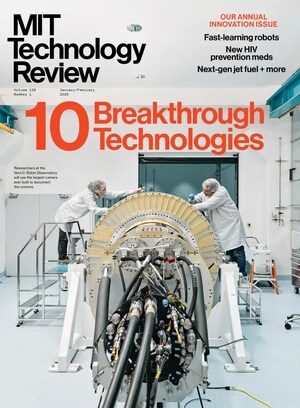MIT Technology Review reveals the list live at its annual sustainability conference, ClimateTech
CAMBRIDGE, Mass., Oct. 4, 2023 /PRNewswire/ -- MIT Technology Review announces 15 Climate Tech Companies to Watch, a new annual list highlighting start-ups and established businesses that have the greatest potential to substantially reduce greenhouse-gas emissions or otherwise address the threats of global warming. The list is now available at TechnologyReview.com and was revealed live in a session led by MIT Technology Review's editor-in-chief, Mat Honan, and Casey Crownhart, climate reporter at the ClimateTech conference.
In a story published today, Introducing MIT Technology Review's 2023 list of 15 Climate Tech Companies to Watch, James Temple, senior editor for energy, notes that while it may seem like a strange time for an optimistic report on climate change, given rising temperatures and wild weather, companies are beginning to make real progress in confronting the dangers of climate change. The list highlights businesses that are developing cleaner ways of generating electricity, storing energy, producing foods, manufacturing goods, and moving people and things around.
"We strived to avoid hype, novelty, and niches, focusing on companies developing technologies that could achieve low enough costs and large enough scales to transform massive sectors," Temple wrote.
The 15 Climate Tech Companies to Watch are:
- Blue Frontier: It's getting hot out there and will only get hotter, which means millions more people will need access to air conditioning just to survive. Air conditioning consumes lots of electricity, which comes mainly from fossil fuels, and leaks harmful refrigerants. Blue Frontier's unique approach cools buildings more efficiently with alternative refrigerants, and its units store energy to avoid overwhelming the grid.
- BYD: Reducing fossil fuel demand with the implementation of better batteries in EVs is the future and the key, perhaps, to reducing harmful emissions. BYD's affordable and versatile cars are making EVs far more accessible and could ultimately help countries including China to dramatically reduce emissions from transportation.
- Climeworks: To prevent catastrophic global warming, we must remove carbon dioxide from the atmosphere in addition to eliminating fossil fuels. So, is there a way we just suck it out of the air? Yes, actually. Climeworks is pioneering one of the most promising approaches: direct air capture, in which giant machines literally suck carbon out of the sky.
- Commonwealth Fusion Systems: Commonwealth Fusion Systems hopes to be the first company to take fusion energy from the lab to the market, turning heat from fusion reactions into steam and producing power without generating harmful emissions. In attendance at ClimateTech.
- Fervo Energy: Enhanced geothermal energy could be a game-changer when it comes to decarbonizing the grid, by significantly expanding the regions that could tap into the steady, carbon-free energy source. Fervo Energy is leading the charge to commercialize the emerging geothermal technology, while pushing the capabilities of what it can do. In attendance at ClimateTech.
- Form Energy: Form Energy uses iron, one of the most common metals on the planet, to build batteries that are not only practical and economical but are able to store renewable energy on the grid for long periods of time.
- GEM: The world of clean tech is built on a lot of minerals—lithium, nickel, cobalt, magnesium, tungsten—that primarily come from mines. GEM is making battery manufacturing more sustainable by mining materials from electronic waste and retired EV batteries, giving them a second life.
- Gogoro: Gogoro set itself apart from its counterparts by making not only scooters but also the batteries that power them and by building out a network of on-demand battery swapping stations. This network means vehicles can power up in seconds and is helping with the transition to electric vehicles.
- H2 Green Steel: Last July, H2 Green Steel broke ground on what could become the world's first commercial-scale clean steel factory, marking a milestone in its quest to reinvent one of the world's dirtiest industrial sectors. In attendance at ClimateTech.
- NotCo: Want fries with that? As more and more people move toward plant-based diets and food options, this Chilean company is bringing vegan burgers, mayonnaise, and chicken that taste more like the real thing.
- NuScale: Nuclear power plants have a checkered past. NuScale is hoping to revitalize the industry with safe and affordable small modular reactors, which could put nuclear power within reach of many more communities.
- Ørsted: Former fossil-fuel company Ørsted has reinvented itself as a renewables powerhouse. The company is leading the charge into a clean energy future by building massive offshore wind farms in Europe and installing some of the first turbines in US waters. In attendance at ClimateTech.
- ReNew: ReNew is playing a critical role in India's energy transition by scaling up the nation's renewable energy capacity, building energy storage infrastructure, and—it hopes—eventually producing green hydrogen.
- Sublime Systems: Did you know cement is the second-most-used substance on the planet (after water) and accounts for roughly 8% of global greenhouse-gas emissions? Sublime Systems is reinventing how we make cement – using electrochemistry to dramatically cut emissions by tweaking the chemical reactions involved and eliminating the need for high temperatures.
- Twelve: Twelve is converting carbon dioxide into sustainable jet fuel and other useful products. While most of the industry is still dependent on kerosene-based fuel, Twelve's work will be critical in tackling emissions from aviation, which makes up 2% of global CO2 pollution.
"Climate change is one of the most complex problems we face," says Amy Nordrum, executive editor of operations. "So we picked companies that reflect the range of solutions being developed today, to show our audience where progress is already being made, and help them understand what must still be done."
For more information on the 15 Climate Tech Companies to Watch, visit MIT Technology Review's website at TechnologyReview.com. #ClimateTech15
About MIT Technology Review
MIT Technology Review is an independent media company owned by MIT. Established in 1899, it was the first-ever technology magazine; today, MIT Technology Review publishes in multiple digital formats every day, including on our site, in email newsletters, and across all major social channels. We also produce a multi-award-winning, bi-monthly print magazine and run one of the industry's most highly regarded events brands, EmTech, which includes EmTech Digital and EmTech MIT.
Our goal is to become the destination for those seeking to understand how technology is shaping our world. Subscribe. Attend. Follow: Facebook, LinkedIn, Instagram.
Media Contact:
MIT Technology Review
[email protected]
SOURCE MIT TECHNOLOGY REVIEW

WANT YOUR COMPANY'S NEWS FEATURED ON PRNEWSWIRE.COM?
Newsrooms &
Influencers
Digital Media
Outlets
Journalists
Opted In






Share this article